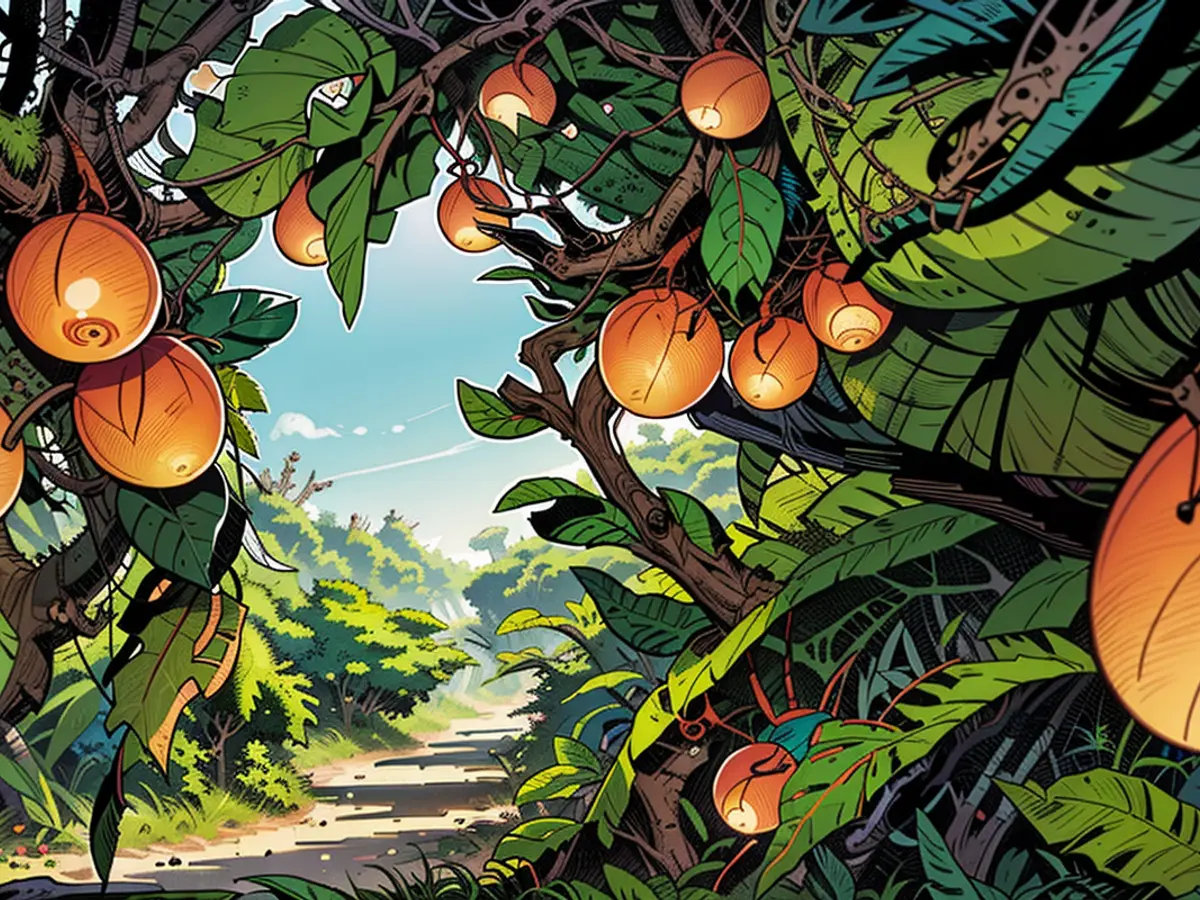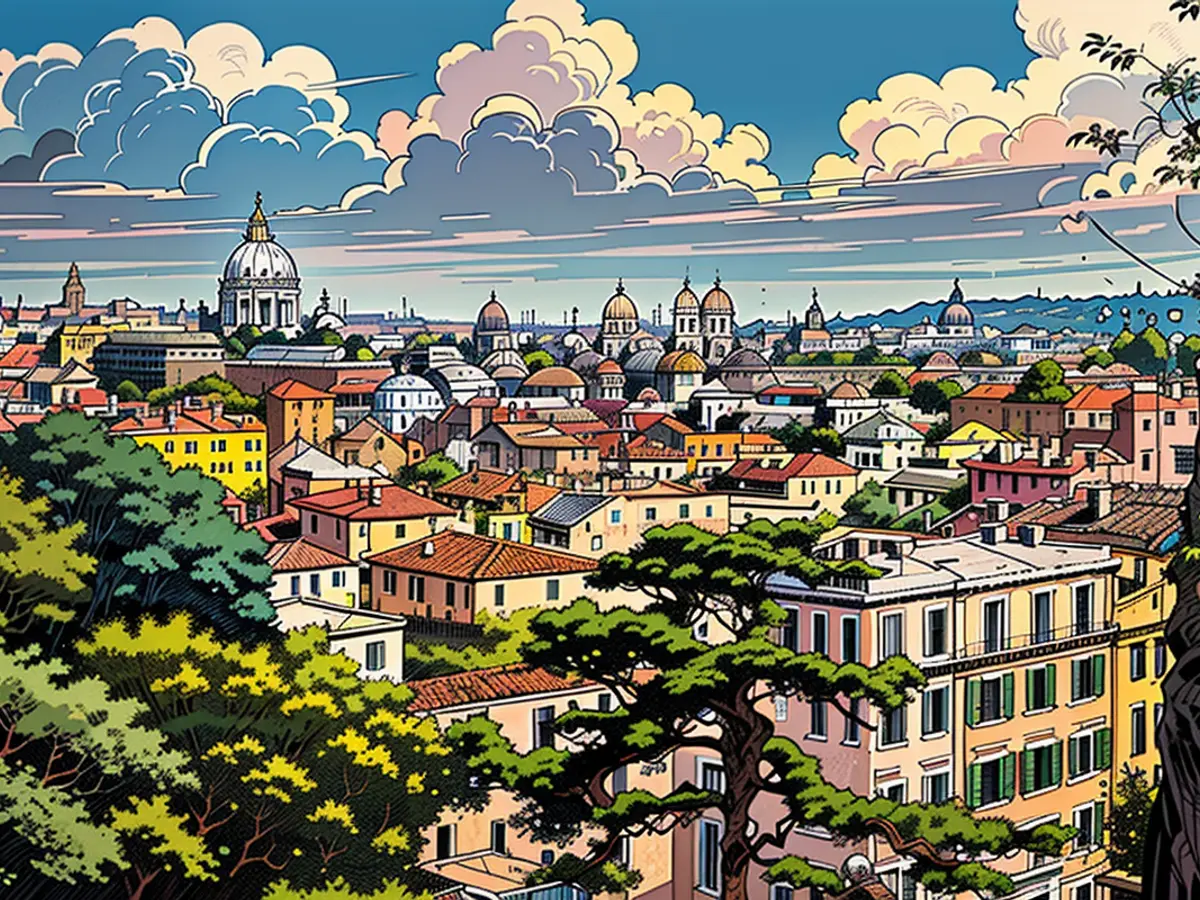Writer Eshkol Nevo explores the themes of trauma and societal expectations surrounding gender roles.
Eshkol Nevo is a prolific author. In the past few years, this renowned Israeli writer has released a new book in Germany almost every two years. However, it's been four years since his latest novel, "Deceptive Attraction," hit the shelves. The book is a collection of loosely linked stories exploring the dangerous allure between individuals. Despite being created during lockdowns, Covid-19 is not mentioned in the book. Instead, the tense feeling of uncertainty and unrest pervades the narrative. Nevo had completed the manuscript before an unprecedented war broke out in his home country, Israel. The outcome of the Hamas attack on Israel and the ensuing Gaza conflict may influence future literary works. Unfortunately, in the present situation, Nevo can't escape into fiction like he did during the pandemic. However, he is finding solace in his role as a storyteller, connecting with people in healing ways.
In our last conversation in 2020, we were still grappling with the pandemic, and Nevo had launched his book "The Truth" in Germany. Now, nearly four years later, a conflict has erupted in the Middle East. How has Nevo been affected?
Eshkol Nevo: I am currently in Italy for readings of "Deceptive Attraction." While I was here on October 7, 2023, Hamas attacked Israel. We faced difficulties returning to Israel due to flight disruptions and other logistical challenges. Despite the hardship, my family and I strongly desired to return home.
Upon your return, how was the atmosphere compared to before the conflict?
Upon my return, I immediately recognized that the entire country is in a state of post-traumatic shock. It wasn't only those directly affected by the tragedy who seemed affected; everyone appeared pale and distressed. In some ways, I became a sort of therapeutic writer. I conducted storytelling sessions with various individuals, including family members of kidnapped individuals, southern Israel residents, and wounded soldiers. This unexpected turn in my writing career is almost surreal, as I studied psychology but chose a different path.
What distinguishes these sessions from your previous readings or workshops?
I still read stories to people, but recently, I've made an effort to select stories that are somewhat healing. This period in my life is filled with both pain and meaning. I am spending time with people who have been injured or have lost loved ones. At the same time, this is one of the most significant periods in my life. I told my Italian students today, "We are storytellers, not entertainers. We can actually have a meaningful impact on other people."
As storytellers, how can we connect with our readers emotionally, especially when delivering news of conflicts or tragedies?
Well, facts are important, but as storytellers, we can also provide access to the emotional side of the story. Remind readers that they still possess empathy despite living in tumultuous times. The fact that a country is at war doesn't mean that values or humanity have been lost. I have agreed to every request I've received, except for one.
What was the one request you refused?
A family asked me to write an eulogy for someone they knew who had passed away. I felt it would be more appropriate for someone close to the deceased to write the eulogy, so I offered to assist. However, I declined the actual task.
Your readers seem to have a particularly close relationship with you. How do you think this is possible, given that Israel may not be as well-known or understood by some readers outside of the region?
It does seem unusual, especially to outsiders unacquainted with Israel. I often receive messages and emails from complete strangers, and I'm unsure of how they obtained my contact information. They ask me to personally inscribe books or place them in publicly accessible electrical boxes, and I'm more than happy to oblige. This practice has continued since the conflict. Being a small country with a tight-knit community, people have shown remarkable unity and compassion during this challenging time.
As an Israeli author, how do you approach presenting your work abroad, knowing that political questions may arise?
As an Israeli writer, I am used to fielding political inquiries, and it is largely expected. I try to share my thoughts and feelings truthfully but without oversimplification. Informing people about the complexities of the situation in Israel and the Middle East can be a challenge, but I am prepared to face whatever comes my way. At the same time, I am happy to return to Italy, where the atmosphere is more peaceful. I long for a return to normality in Israel, not just for myself but also for the sake of my daughters. Despite the current upheaval, I am optimistic about the future and hopeful that peace and stability will eventually prevail.
The phrase also holds significance in your upcoming novel and required special clarification in the translation. It could denote a citrus plantation, orchard, or the biblical paradise. Furthermore, it sheds light on the meaning of the acronym "PaRDeS" in the Talmud.
There wasn't a significant gap between the end of the pandemic and the unfavorable circumstances that ensued in the Middle East since then. Is it even possible to escape into fiction at present?
The novel under discussion was penned during the pandemic. I drafted the first section during the initial lockdown, the second section during the second lockdown, and then the third lockdown commenced, necessitating the completion of the book. I was strolling in an orchard nearby with my spouse when we encountered a distressed woman who informed us her husband had ventured into the orchard and hadn't returned. We joined her in search, but we ultimately had to depart, and we never discovered his fate. And I mused: perhaps this could be the novel's conclusion.
I hadn't anticipated that this segment of the novel would be founded on a real-life event.
The occurrence in Latin America transpired several years ago. In South America, I encountered a couple, and later, I read in the media that one of them had perished in a bicycle accident. The notion that it wasn't an accident crossed my mind. However, the family was not prepared to engage with me at the time, giving me the impression that I was on to something. Years later, I incorporated it into my novel.
What did the family say? Did they consent to the depiction in such a manner?
No, they remain unaware. I also altered numerous aspects of the narrative, with the event serving as inspiration rather than fact. Therefore, the initial and final sections of "Deceptive Attraction" are inspired by authentic occurrences. Moreover, the second section is similarly inspired, although I cannot elaborate on that, as it pertains to our family history.
This inevitably piques your curiosity - as a reader, you yearn to distinguish reality from fiction, what has already transpired from what may yet occur. The bacchanalian celebration towards the end of the book seems to foreshadow what transpired at the Nova Festival on October 7th.
I was frequently inquired about this. However, sometimes, you are an unwanted prophet. I merely sought to describe a wild party where hallucinogenic substances are in use, an event where anyone, regardless of their gender, can assume the roles of both men and women.
Why does the book revisit this theme towards the conclusion?
The entire concept of gender has evolved substantially. I am heterosexual and adhere to traditional views. However, my daughters enlighten me to the idea that it is now more fluid. People can experience both kinds of feelings and continuously redefine themselves. That's why I wished to pen a novel about the relationship between men and women that concluded in a more open manner, raising questions. In this chaotic fantasy party, there is the potential for experiencing sex as the other gender. And my character makes an unexpected choice, she desires to be a male for a brief period in her life. There are still ambiguous areas between men and women that are baffling. It is captivating to explore these themes.
Covid does not feature prominently in the book despite being written during the lockdowns. No tests, no masks, no vaccines.
No, not Covid-19, but rather Corona. Nevertheless, readers claimed to feel the pandemic's presence throughout the book, as turbulence during a flight. Turbulence, which is also the title of the French translation. Each character experiences unanticipated turbulence. One falls in love in an unconventional manner. Another experiences dilemmas at the hospital where they work. And the woman in the third part loses her husband, who simply disappears, which is arguably the most heart-wrenching tragedy. In a way, this novel closely approximates a thriller among all my novels. I sought to intrigue the reader, questioning who is right, who is wrong. Who is good, and who is bad? However, unlike a thriller, there are no definitive answers. No one will receive clear answers. You will not uncover a body. You will not find a solution to the whodunit. Everything remains shrouded in mystery.
So did the pandemic impart the book a more ominous overtone?
For me, it was the opposite. These truly traumatic incidents served as a distraction from the pandemic, requiring me to discover the denouement. While everyone was confined to their residences, I was mentally traversing South America. I harbored an unusual affection and was searching for a missing male figure in the orchard. I wouldn't say I enjoyed the experience, but there was an abundance of energy. Additionally, I composed the entire novel with headphones, listening to music incessantly.
The music truly stirred up my emotions, serving as the only form of activation during those Covid times, devoid of any in-person interactions or engagements. I didn't conduct any writing workshops, nor did I offer any readings. Music was my sole companionship on my writing journey.
So, how about now? The pandemic seems to be behind us, yet Israel is engulfed in a devastating conflict.
The dynamics have significantly shifted since October. All I could do was pen down my experiences in a diary. I shared some chapters of it in Italy, as well as Germany. This became my means of coping. I've rarely ventured into the realm of autobiographical writing, or sharing reality through my personal perspective. However, fiction took a backseat in my life during these times. I believe it'll take some time to understand and process the current situation. I'm unsure if it'll ever be possible to transform this reality into a work of fiction. For now, I continue to chronicle my experiences in my personal diary. And that's perfectly fine by me.
A conversation between Eshkol Nevo and Samira Lazarovic
Despite the traumatic events experienced during the conflict, Eshkol Nevo found solace in his role as a storyteller, connecting with people in healing ways. During this time, he conducted storytelling sessions with individuals affected by the conflict, finding meaning in his writing career.
The sessions with conflict victims were different from Nevo's previous readings or workshops due to their emotional intensity and therapeutic nature. His stories, chosen to be healing, helped him connect with people who had been injured or lost loved ones during the conflict.








